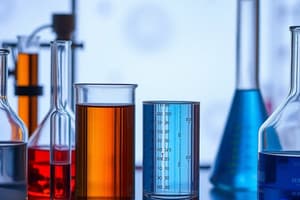Podcast
Questions and Answers
Which statement best differentiates a scientific law from a scientific theory?
Which statement best differentiates a scientific law from a scientific theory?
- A scientific law is accepted by all scientists, while a scientific theory is still under debate.
- A scientific law is a proven fact, whereas a scientific theory is a speculative idea.
- A scientific law describes *what* happens, while a scientific theory explains *why* it happens. (correct)
- A scientific law is based on experimental data, while a scientific theory is based on observational data.
How do ethical considerations influence scientific advancements and their application?
How do ethical considerations influence scientific advancements and their application?
- They are only relevant in medical research, not in fields like technology or engineering.
- They primarily accelerate the pace of research by removing bureaucratic obstacles.
- They ensure that advancements are aligned with societal values and minimize potential harm. (correct)
- They have minimal impact, as scientific progress is inherently beneficial.
Consider a new scientific discovery with potential applications in both medicine and military technology. What would be the most comprehensive approach to evaluating its societal impact?
Consider a new scientific discovery with potential applications in both medicine and military technology. What would be the most comprehensive approach to evaluating its societal impact?
- Focusing solely on the economic benefits of the discovery.
- Prioritizing the application that generates the most immediate profit.
- Deferring to the scientists involved to make decisions, as they best understand the implications.
- Analyzing both the potential benefits and risks across multiple domains, including ethical, social, and environmental factors. (correct)
Which of the following questions falls primarily outside the realm of scientific inquiry?
Which of the following questions falls primarily outside the realm of scientific inquiry?
A research team is investigating a phenomenon that appears to violate established physical laws. Which approach would be most aligned with scientific principles?
A research team is investigating a phenomenon that appears to violate established physical laws. Which approach would be most aligned with scientific principles?
A researcher observes a new phenomenon that contradicts an established theory. Which course of action aligns best with the scientific method?
A researcher observes a new phenomenon that contradicts an established theory. Which course of action aligns best with the scientific method?
Which scenario best exemplifies the principle of falsifiability in scientific research?
Which scenario best exemplifies the principle of falsifiability in scientific research?
Why is peer review considered a critical process in science?
Why is peer review considered a critical process in science?
In a study examining the impact of a new drug, researchers divide participants into a treatment group and a control group. What is the primary role of the control group?
In a study examining the impact of a new drug, researchers divide participants into a treatment group and a control group. What is the primary role of the control group?
How does a scientific theory differ from a hypothesis?
How does a scientific theory differ from a hypothesis?
What is the main challenge in applying the scientific method to social sciences compared to natural sciences?
What is the main challenge in applying the scientific method to social sciences compared to natural sciences?
A study finds a strong correlation between ice cream sales and crime rates. What conclusion can be accurately drawn from this data?
A study finds a strong correlation between ice cream sales and crime rates. What conclusion can be accurately drawn from this data?
If an experiment yields data that consistently contradicts the initial hypothesis, which step should a scientist take?
If an experiment yields data that consistently contradicts the initial hypothesis, which step should a scientist take?
Flashcards
Scientific Law
Scientific Law
A statement that describes an observed phenomenon.
Scientific Theory
Scientific Theory
An explanation of why a phenomenon happens, based on evidence.
Applications of Science
Applications of Science
The use of scientific knowledge in various fields like medicine and technology.
Limits of Science
Limits of Science
Signup and view all the flashcards
Ethics in Science
Ethics in Science
Signup and view all the flashcards
Scientific Method
Scientific Method
Signup and view all the flashcards
Controlled Experiments
Controlled Experiments
Signup and view all the flashcards
Natural Sciences
Natural Sciences
Signup and view all the flashcards
Falsifiability
Falsifiability
Signup and view all the flashcards
Peer Review
Peer Review
Signup and view all the flashcards
Types of Scientific Investigations
Types of Scientific Investigations
Signup and view all the flashcards
Scientific Principles
Scientific Principles
Signup and view all the flashcards
Study Notes
Scientific Method
- Science is a systematic enterprise that builds and organizes knowledge in the form of testable explanations and predictions about the universe.
- The scientific method is a systematic approach to acquiring knowledge. It involves observing, questioning, forming hypotheses, testing, and analyzing results.
- Key aspects involve observation, forming a testable explanation (hypothesis), designing and conducting experiments to test the hypothesis, analyzing the results, and drawing conclusions. If results support the hypothesis, it strengthens the theory; contradictory results suggest revisions or new hypotheses.
- Controlled experiments isolate the effect of a single variable by manipulating it while holding other factors constant, aiding in establishing causality.
- Different types of scientific investigations include descriptive studies, correlational studies, and experimental studies.
Branches of Science
- Natural Sciences investigate the physical world.
- Physics explores fundamental laws of nature, including motion, energy, and forces.
- Chemistry deals with the composition, structure, properties, and reactions of matter.
- Biology investigates living organisms and their processes.
- Earth Sciences study Earth's structure, processes, and history. This encompasses geology, meteorology, oceanography, and astronomy.
- Social Sciences explore human behavior and society. These encompass economics, psychology, sociology, and political science.
Scientific Principles
- The scientific method relies on evidence-based reasoning. Observations and experiments must be repeatable and verifiable by others.
- Objectivity and skepticism are critical in science. Scientists must be impartial in observations and analysis, and critically evaluate their own and others' findings.
- The principle of falsifiability: A scientific theory must be testable and potentially disprovable (falsifiable). If a theory is not testable or falsifiable, it's not considered scientific.
- Peer review: Scientific findings are often published in peer-reviewed journals to ensure quality, validity, and reliability.
Scientific Theories
- A scientific theory is a well-substantiated explanation of some aspect of the natural world, based on a large body of evidence. It is not a mere guess or hypothesis.
- Theories are constantly refined and updated as new evidence emerges.
- The difference between a law and a theory: A scientific law describes an observed phenomenon, while a theory explains why that phenomenon occurs.
Scientific Applications
- Science has applications in various fields like medicine, technology, agriculture, and environmental protection.
- Technological advancements are often driven by scientific research and discoveries.
Science and Society
- Scientific advancements can have significant positive and negative impacts on society. Ethical considerations are critical in the development and application of scientific knowledge.
- Public understanding and engagement with science are essential for informed decisions and societal progress.
Limitations of Science
- Science is limited by the nature of the things it studies. Some phenomena may be currently unknowable or impossible to study empirically with current tools or knowledge.
- Science cannot answer all questions. Questions of morality, ethics, meaning, and spirituality are outside the scope of scientific inquiry.
Studying That Suits You
Use AI to generate personalized quizzes and flashcards to suit your learning preferences.
Description
Explore the scientific method: observation, hypothesis, experimentation, and analysis. Learn about controlled experiments and different types of scientific investigations. This covers the basics of science as a systematic approach to knowledge.




